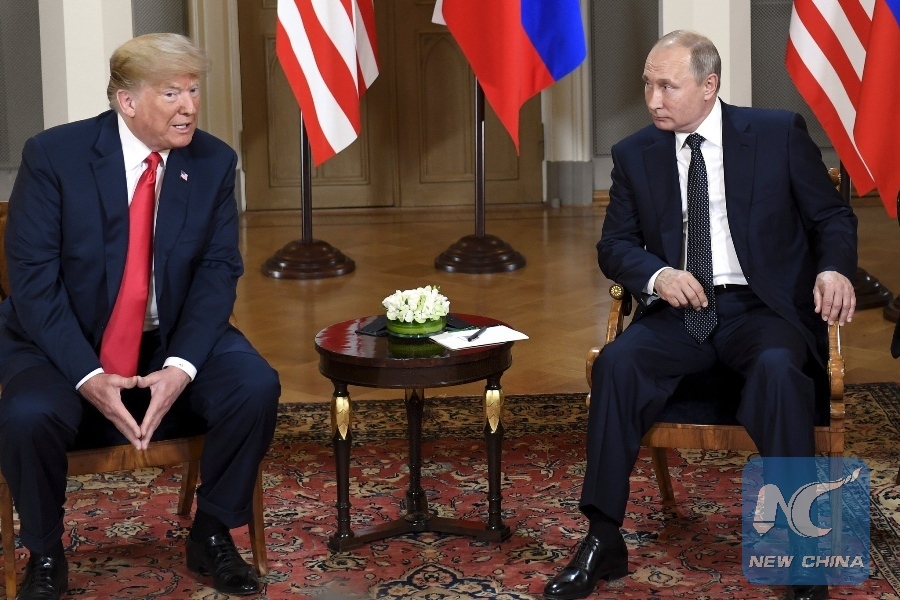
U.S. President Donald Trump (L) meets with his Russian counterpart Vladimir Putin in Helsinki, Finland, on July 16, 2018. (Xinhua/Lehtikuva/Heikki Saukkomaa)
by Xinhua writers Zhu Dongyang, Matthew Rusling
WASHINGTON, Aug. 8 (Xinhua) -- U.S. experts have said the announcement on Wednesday of fresh U.S. sanctions against Russia over an alleged nerve agent attack on a former Russian spy and his daughter will further worsen the ties between Washington and Moscow.
Heather Nauert, spokesperson for the U.S. State Department, said Washington determined on Monday that the Russian government "used chemical or biological weapons in violation of international law or has used lethal chemical or biological weapons against its own nationals."
She added that sanctions, which are based on the Chemical and Biological Weapons Control and Warfare Elimination Act of 1991, will take effect on or around Aug. 22, following a 15-day congressional notification period.
According to senior State Department officials, the sanctions will come in two phases. The first phase will ban the granting of licenses to sell "all national-security sensitive goods or technologies" to Russia.
At the moment, such sales applications are being scrutinized on a case-by-case basis, and Washington "will be presumptively denying such applications" after the sanctions come into force.
They said unless Russia, within three months since the sanctions become effective, provides "reliable assurances" that it will no longer engage in chemical weapons use and allows on-site inspections by the United Nations or other internationally recognized impartial observers, the second batch of "more draconian" sanctions will be imposed.
The officials estimated that the sanctions may affect hundreds of millions of dollars worth of exports, dealing a blow to some 70 percent of the Russian economy and resulting in an approximately 40-percent fall in workforce.
Sergei Skripal, a 66-year-old double agent who worked for the Soviet military's intelligence services before defecting to Britain, and his 33-year-old daughter Yulia were found unconscious on a bench outside a shopping center in the southwestern British city of Salisbury on March 4.
The British government accused Russia of masterminding the poisoning, which it said involved the use of Novichok nerve agent. Russia has denied any involvement.
In a separate case on June 30, 44-year-old Dawn Sturgess and her partner, Charlie Rowley, were hospitalized after being exposed to what British authorities confirmed was Novichok in Amesbury in southwestern England. Sturgess later died while Rowley remained in critical condition.
Britain on Monday asked the Organization for the Prohibition of Chemical Weapons (OPCW), the international chemical weapons watchdog, for assistance in the investigation of the Amesbury attack.
The OPCW said Tuesday in response to the request that it "will deploy a technical assistance team for a follow-up visit and to collect additional samples."
Russia has vehemently denied any role in both attacks. The Russian Embassy in Britain said Wednesday that London's invitation of the OPCW lacked transparency.
"The technical assistance requested by the British authorities to 'independently confirm the identity of the nerve agent,' unfortunately, lacks transparency and attests to UK's arbitrary interpretation of the CWC (Chemical Weapons Convention)," the embassy's press officer was quoted by Russia's Sputnik news agency as saying.
Given that the chance for reconciliation from Moscow is slim, U.S. experts said the sanctions may continue to hurt the Russian economy and drive further the vicious cycle of U.S.-Russia hostilities.
Ford O'Connell, a Republican and news commentator who frequently shows up on TV, told Xinhua that "this is a situation where Trump has been tough on Russia, particularly when Russia is perceived to be bad actors threatening the world order."
Nile Gardiner of the Heritage Foundation said U.S. policy toward Russia is strengthening rather than weakening following the Helsinki Summit between U.S. President Donald Trump and Russian President Vladimir Putin. "President Trump gave Russia the opportunity to change its aggressive ways, but clearly Putin is not interested in doing so."
The scholar foresees "a further deterioration of U.S.-Russian relations, and an increasingly hardline stance from Washington towards Moscow."
William Courtney, an adjunct senior fellow at RAND Corporation, took a similar tough stance on Russia, arguing that Washington has other interests with Moscow beyond maintaining good bilateral relations, such as deterring Russia's continued use of weapons that are illegal under the CWC.
Carrot-and-stick diplomacy is not unusual, he said. "U.S. and Western strategy with Russia is to cooperate in areas of mutual advantage, but also to deter and raise the cost to it of malign activities."

